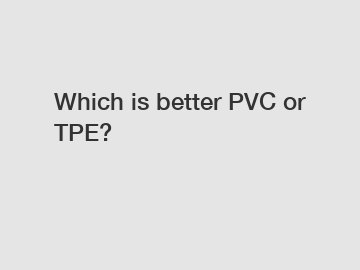Which is better PVC or TPE?
In today's world, we are constantly surrounded by numerous products made from different materials. When it comes to choosing the right materials for various applications, two popular contenders are PVC (Polyvinyl Chloride) and TPE (Thermoplastic Elastomer). Both have unique characteristics and advantages that make them suitable for a wide range of uses. In this article, we will delve deep into the properties of these materials to determine which one comes out on top. So, let's unravel the PVC vs. TPE debate and settle it once and for all!
Understanding PVC:
Polyvinyl Chloride, or PVC, is a synthetic plastic polymer known for its excellent durability and rigidity. It is commonly used in applications that require strength, weather resistance, and low cost. PVC is widely employed in construction materials, plumbing pipes, window frames, electrical cables, and a variety of everyday products. It is highly regarded for its chemical stability and resistance to fire, water, and chemicals. Furthermore, PVC can be easily molded into various shapes, making it a versatile choice for many applications.

Evaluating TPE:
On the other hand, Thermoplastic Elastomer (TPE) is another popular material known for its flexibility, soft texture, and stretchability. TPE is created by blending polymers typically based on rubber with thermoplastics. This material is ideal for applications that require flexibility, impact resistance, and a soft touch. TPE finds its place in industries such as automotive, electronics, toys, medical devices, and household goods. It offers excellent resistance to UV rays, ozone, moisture, and chemicals, thereby ensuring superior long-term performance and lifespan.
Bursting the PVC and TPE Myths:
Comparing Key Characteristics:
1. Flexibility: TPE offers superior flexibility compared to PVC, as it exhibits elastomeric properties while maintaining excellent shape retention and elasticity. This feature makes TPE a preferred choice for applications requiring repetitive movements or stress.
2. Strength and Durability: PVC possesses high strength and rigidity, making it perfect for products that demand structural integrity. However, TPE can compete with PVC's durability, especially in custom formulations tailored to withstand various environmental factors.
3. Chemical Resistance: PVC is renowned for its excellent chemical resistance, making it ideal for applications that involve exposure to corrosive agents. TPE, while offering good resistance to chemicals, may not match the level provided by PVC.
4. Cost-effectiveness: PVC is generally more cost-effective than TPE due to its availability, ease of production, and widespread use. However, for certain specialized applications, TPE's superior performance may justify the higher cost.
Making an Educated Decision:
When selecting between PVC and TPE, it is crucial to consider the specific requirements of the application. PVC excels in applications that demand strength, rigidity, and resistance to harsh conditions. TPE, meanwhile, is best suited for applications where flexibility, softness, and impact resistance are critical. Manufacturers often collaborate with material experts to determine the most suitable choice based on factors such as environmental concerns, regulatory compliance, and long-term performance.
Conclusion:
In the PVC vs. TPE debate, there is no conclusive "better" material. Both PVC and TPE offer unique advantages, making them suitable for a wide range of applications. PVC's strength, rigidity, and chemical resistance excel in certain scenarios, while TPE's flexibility, softness, and enhanced impact resistance make it the material of choice in other situations. Understanding the distinct characteristics of each material and evaluating specific application requirements will help make an informed decision. Remember, collaboration with material experts is always advisable to ensure the best choice for your needs.
Ultimately, the key lies in selecting the material that best aligns with the desired attributes and demands of your specific project or purpose. Whichever material you choose, rest assured that both PVC and TPE have been extensively used and trusted in an array of industries, guaranteeing reliable performance and durability for years to come.
If you are looking for more details, kindly visit vip logo for car, car mat press machine exporter, car mar cutting machine supply.


